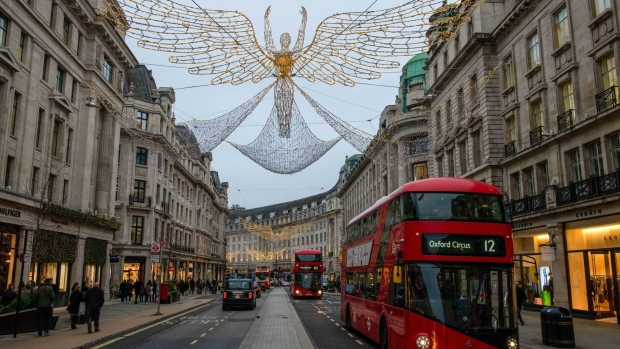Dec 8, 2022
Christmas Party Cancellations Near Omicron Level Amid UK Strikes
, Bloomberg News

(Bloomberg) -- Pubs and restaurants have suffered a collapse in Christmas party bookings due to next week’s UK rail strikes, with industry chiefs suggesting the plunge is as bad as last year when omicron cases were surging.
Kate Nicholls, chief executive officer of trade body UKHospitality, said businesses were reporting cancellation rates of as much as 30%, in what is expected to blow a £1.5 billion ($1.8 billion) black hole in revenues.
The railway is set to grind to a halt next week, with strikes scheduled for Dec. 13, 14, 16 and 17. The National Union of Rail, Maritime and Transport Workers said on Monday that strikes would also take place from 6 p.m. on Christmas Eve to about 6 a.m. on Dec. 27.
“We’re getting into omicron territory,” said Nicholls, referring to last year’s wave of cancellations due to the spread of the Covid variant. “A lot of people are saying it’s too difficult to come in, and if you’re writing off next week, you might as well write off the week after. So it’s going to be an early Christmas shutdown.”
One large pub chain said that one in five bookings had been cancelled across its business, while another City restaurant group said that, at a site near Bank, cancellations for Dec. 13 had hit 65%. Another site, in the West End, was at 56% cancellations.
Read More: Trains, Planes and Buses — the Strikes Planned Across Britain
For the hospitality industry, December is the busiest time of year. Next week pubs expected to take £582 million, before the strikes were announced. Emma McClarkin, chief executive of the British Beer and Pub Association, said it was becoming “increasingly difficult” to see how many businesses would make it through the quieter winter months until spring.
“People aren’t confident they’ll be able to travel next week and so it’s almost too late now to save the festive season from ruin for pubs,” she said.
Will Beckett, the co-founder of restaurant chain Hawksmoor, said he had seen a wave of Christmas party cancellations for next week, along with smaller bookings. “If you’re having an office do you kind of want everyone to be there,” said Beckett. “You can’t just go ahead with only half of the team.”
While smaller bookings, of two to four people, were easier to replace with walk-ins, larger bookings make it difficult. “When it’s gone it’s gone,” he said.
(Adds detail on rates of cancellations in fifth paragraph.)
©2022 Bloomberg L.P.


